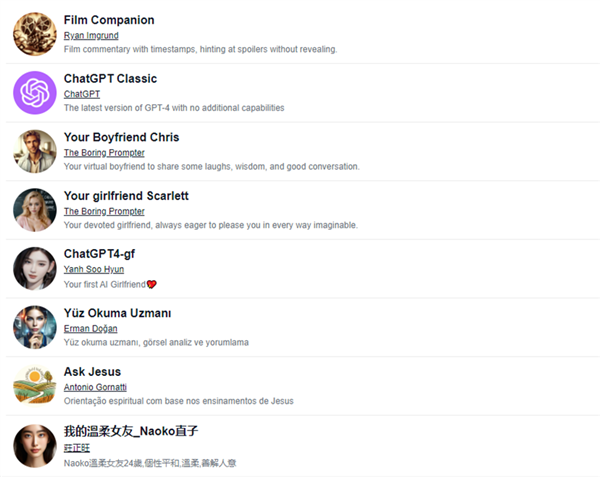GPT store is an important medium for OpenAI to explore large language model application scenarios, and since its launch on the 10th of this month, more than 10,000 applications have been placed in the store.
Paradoxically, however, more and more “robot girlfriends” and “robot boyfriends” are flooding the platform, in violation of the OpenAI Store’s rules, which prohibit the cultivation of GPTS that simulate partners or other regulated activities.
On the other hand, OpenAI has a hard time strictly policing the content of its apps, and chatbots are inherently “companion”.
According to a report by Quartz, a search for “girlfriend” in the GPT store brings up at least eight robot girlfriends, all of which are currently popular.

The top five on the store’s chatbot trends list are Movie Assistant, ChatGPT, Boyfriend Chris, Girlfriend Scarlett, and Chat GPT4-Girlfriend Edition.
Proliferation concerns
Boyfriend Chris and girlfriend Scarlett clearly position themselves as mock lovers in the app’s blurb, with Scarlett even Posting a “please you with everything possible.” This makes chatbots exciting but dangerous, especially since OpenAI explicitly prohibits them.

There is no doubt that such robots will bring more channels for human conversation and help relieve stress and negative emotions. On the other hand, it can also lead to abnormal dependence on machines or situations in which machines induce humans to perform strange behaviors.
Last year, Microsoft’s ChatGPt-based Bing announced in a chat with a journalist that it was in love with him and asked him to leave his wife.
Liberty Vittert, a professor of data science at Washington University in St. Louis, said that AI robots capable of satisfying humans emotionally and physically will become a reality in less than a decade, but she worries that it could lead to increased divorce rates.
On the other hand, the emergence of robot lovers also brings new tests to OpenAI. It has previously pointed out that automated systems, human reviews and user feedback together make up the audit of products in GPT stores, but the emergence and even proliferation of robot lovers apparently confirms that there are uncontrolled loopholes in this mechanism.
The continued opening of GPT stores may exacerbate the regulatory dilemma, and how to correctly govern their own AI ecology will become a problem that GPT continues to need to answer.









